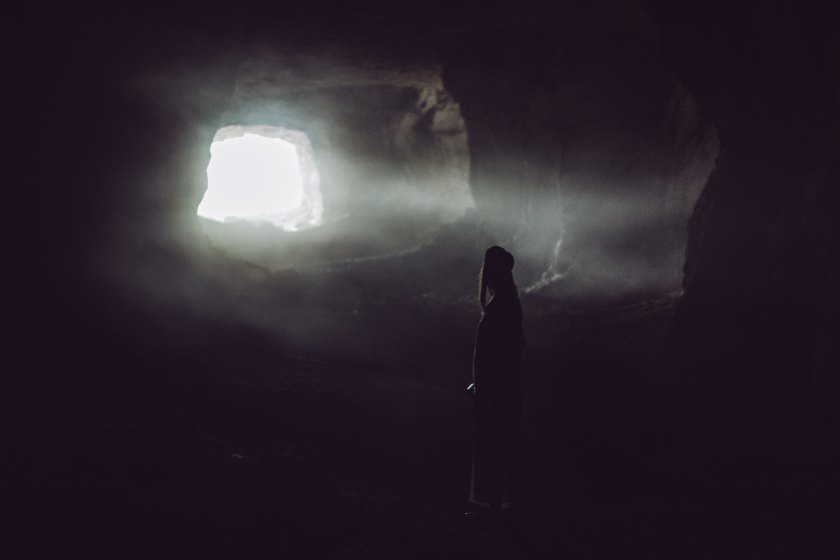
As I finalize my manuscript for Women Rise Up, to be published with the FAR press in early 2019, I want to share this excerpt from my chapter on Mary Magdalene.
The Spirit of God moves at unexpected times and places. When I spot a single red bloom among the barren trees in wintertime. When I watch my daughter takes a bite out of sun-ripened strawberry. When something catches me off guard and pulls my full attention to the present moment. These breath-taking moments illuminate the presence of Spirit at work.
One frigid Saturday morning I took the two-hour train ride from New Haven, Connecticut where I was living at the time to New York City for the day. I’d been invited to join a gathering of advocates working to end gender-based violence. Around a hundred of us made our way to an upper-floor classroom at The New School in Greenwich Village. When we entered the room, most of us were strangers, but in a matter of hours, we managed to form a sacred community of survivors. We took turns sharing our own pain-filled stories of violence, betrayal, survival, and hope. Both gut-wrenching and healing, the act of naming our collective suffering fused us together: our cacophony of individual experiences blended into a unified chorus for justice. What once was hidden had now come into the light.
As we were preparing to leave, the song “Walking on Broken Glass” by Annie Lennox filled the room. Without hesitation or prompting, we all began to dance. I distinctly remember thinking, I don’t care what I look like. I don’t care what anyone thinks. I want to dance! I felt free, uninhibited. For the first time I understood the meaning of “You have turned my wailing into dancing” (Ps 30:11).
I couldn’t tell you how long we danced in that room. It felt like forever — and like a moment. But I remember thinking, I never want to leave this place. I longed to soak in that newfound feeling of joyous freedom. Eventually the music died down. It was time for me to catch my train back home. As I walked the twenty blocks back to Grand Central Station, I couldn’t quite wrap my mind around what had happened in that room, but I knew that I’d had an unexpected encounter with God and that I would never be the same.
When I think about biblical moments of divine surprise, Mary Magdalene’s appearance at Jesus’s tomb immediately comes to mind.
The morning when Mary Magdalene comes to the place where Jesus has been laid to rest, the early light of the sun has yet to break. The world, having returned to its normal rhythms, is still heavy with darkness. But she cannot sleep, not with the harrowing images of his death haunting her dreams. She makes her way alone through the darkness to her friend’s tomb where she will present her humble offering of unencumbered grief. There she will give in to the waves of mourning as they crash over her again and again.
Her plans to grieve in the solitude of night are thwarted by a stunning discovery: the stone that had been placed in front of Jesus’s place of burial is no longer there. She seeks the help of some of the disciples who confirm what she most fears: the body is gone.
Mary feels compelled to enter the empty tomb herself. As she peers inside the lightless space, she encounters two angels standing by Jesus’s burial garment. But then a voice calls to her from outside the dark tomb: “Woman, why are you weeping?” She peers outside, her eyes unable to make out the figure shrouded by the darkness. It must be the gardener. But then he speaks her name. With the utterance of a single word the impossible has been made possible. Jesus is not dead. He is here. He is alive. He knows her name.
Only a handful days have passed since her heart was ripped open by the violent murder of her friend and teacher. She comes to the grave to grieve only to discover that his body is gone. She is devastated, her grief compounded. But in an instant, her weeping is transformed into dancing when she hears Jesus speak her name. She must want to stay in that place with him forever. But Jesus has other plans for her. He says, “Go and tell what you have seen.”
Like Mary Magdalene, each of us is called to be witnesses to the ways that God brings forth life from death. In our sharing of these resurrection moments, we become the bearers of hope through which community is formed, truth is revealed, and lives are redeemed.
Speaking our truth takes courage. Many people would rather not hear our truth, especially if what we have to say disrupts the status quo and demands a change. But we will not be silenced. We will not deny what we have seen—the places where God is bringing forth new life, the places where God is calling us to bear witness to the truth of death-conquering love.
We will be like Mary Magdalene in our truth-telling. We will usher in a new era of justice, kindness, and mercy.
We will rise up.
To sign up for book updates, please visit kateyzeh.com/women-rise-up.
 Rev. Katey Zeh is an ordained Baptist minister, a nonprofit strategist, writer, and speaker at the intersections of faith and gender justice. She is the Executive Director of BrightDot Academy, a personal and professional enrichment initiative of the performance consulting firm Crouch & Associates. She is the co-host of Kindreds, a podcast for soul sisters. Her book Women Rise Up will be published by the FAR Press in early 2019. Find her on Twitter at @kateyzeh or on her website kateyzeh.com.
Rev. Katey Zeh is an ordained Baptist minister, a nonprofit strategist, writer, and speaker at the intersections of faith and gender justice. She is the Executive Director of BrightDot Academy, a personal and professional enrichment initiative of the performance consulting firm Crouch & Associates. She is the co-host of Kindreds, a podcast for soul sisters. Her book Women Rise Up will be published by the FAR Press in early 2019. Find her on Twitter at @kateyzeh or on her website kateyzeh.com.


And who will comfort the women who spoke out about abuse by the now Supreme Court Justice who shall not be named: Julie Swetnick, Christine Blasey Ford and Deborah Ramirez–not to mention the scores of other women he gang-raped, groped, felt up, thrust his dick in the faces of, and otherwise assaulted when he was dead drunk? How can we comfort those who now suffer the additional trauma of knowing that their speaking up did not stop a bunch of old white men and some younger white men and white women from voting for is a serial abuser and most probably a serial rapist! If there are any angels around these days, why didn’t they put in an appearance? (I know my answer to my own question–there are no miraculous interventions and no individual rises from the dead, only our courage and kindness can heal the world.)
LikeLiked by 5 people
Carol, I feel this deeply. I could barely get myself off the couch after I heard about the confirmation. What was the point of bearing our pain publicly once again? Will nothing ever change? And yet… something stirs within me that keeps hope alive. These ancient stories manage to lift me out of that despair and back into believing that something is changing for the better.
LikeLike
Love this homage to Mary Magdalene, where you say: “We will be like Mary Magdalene in our truth-telling. We will usher in a new era of justice, kindness, and mercy.” Yes, yes, may it be so.
LikeLiked by 1 person
I pray that it might be!
LikeLike
I see communities of women rising from death, and speaking their names.
LikeLiked by 1 person
I see them as well, Barbara.
LikeLike
I’m always amazed at the inclusion of Mary Magdalene in the Gospels, she really does give it a depth of reality, and not just a story or a myth.
LikeLiked by 1 person
Me too! I love her story.
LikeLike
This is a beautiful tribute to Mary Magdalene whose story stayed with me long after most of the others faded – and you have articulated why – She did have an experience of what can happen in the spaces in between. It is also important to recognize that in this myth it was a WOMAN who had this experience…
With that much said, I am with Carol in that I don’t see a new era of justice etc emerging … I see women who are suffering horribly from the most recent travesty – silenced, their faces slapped, their words discarded, their souls stolen – or that is how it feels to me because I am one of those women. No divine intervention here.
LikeLiked by 3 people
I waver back and forth between despair and hope, probably something like what Mary Magdalene experiences as well. My only comfort is knowing that this pain is nothing new, and that women have been resisting against all odds.
LikeLike
You’re familiar, I’m sure, with Elizabeth Cunningham’s Maeve books. Maeve is the Celtic Magdalen, and she first sees Jesus in a vision, then meets him in person in Celtic training, She’s banished from the island on which she grows up, goes to Rome, then to Jerusalem, where she meets him again…and of course finds the empty tomb. These four books are filled with divine encounters.
Your learning day sounds beautiful. Thanks for sharing with us and for speaking (and writing) truly.
LikeLiked by 3 people
Thanks for mentioning Maeve, Barbara. That scene in the garden was one of the most beautiful to write/live. In The Maeve Chronicles, Maeve has been through it all–all that women go through, still suffer today. In this version she is not a disciple, not a convert, but a force to be reckoned with in her own right. She has her own apotheosis, as perhaps we all do, in our acts, (thanks, Carol!) of courage and kindness.
Thanks for this beautiful invocation of her spirit, Katie!
LikeLiked by 4 people
Correction with apologies: Thank you, Katey!
LikeLike
I wasn’t quite sure how to address the apotheoses both Maeve and Jesus have. But the scene is very powerful. Yes, I bet lots of us go through our own apotheoses and just don’t talk about them. They’re too private.
What do other readers of this column think?
LikeLiked by 1 person
I must read these! Elizabeth, this sounds like an incredible series.
LikeLiked by 1 person
Katey, this is beautiful and makes me think this morning about the many divine encounters of my life. And raises up within me a flood of gratitude. Looking forward to your book! Love, Judy
LikeLike
Beautifully written. Thank you for sharing.
LikeLike